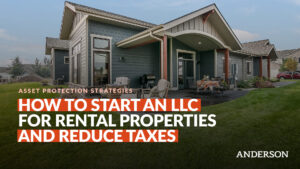
Whether you have a small business, real estate, or a large corporation, you may face financial risks to your assets. To formulate an asset-protection plan, you should learn the definition of assets and the types of financial risks you may encounter. When you work with a financial advisor to set up your asset-protection strategy, you can help stop creditor claims that may affect your financial wealth.
Key Takeaways
- Assets are resources of value that you or your business own.
- Financial risk can cause loss of income or creditor claims against your assets.
- Real estate investors can face enormous financial risks.
- Property owners and managers must understand potential claims from tenants and face the risks.
- Having an asset-protection strategy is vital for reducing financial threats to assets.
Tax & Asset Protection Workshop
Learn about Real Estate & Asset Protection at our next
FREE LIVE STREAM
What Are Assets?
Assets are anything of value that you own, including property, vehicles, jewelry, investments, bank accounts, furniture, artwork, and other business-related items. Many financial institutions consider assets as current, fixed, financial, or intangible. By owning assets, you hope to increase your business’s value or benefit your company in some way. Asset properties include:
- Economic value: An asset can be owned personally or through a company. Assets with high economic value can increase cash flow or cash equivalent. The economic value of assets is also based on how easily they convert to cash or a cash equivalent.
- Ownership: All assets need a title to an individual or entity. You should select a beneficiary for each asset.
- Tangible or intangible: Are the assets tangible, such as a car or boat, or intangible, such as a patent or intellectual property? For clarity, it’s important to classify assets by their physical existence.
- Asset usage: Operating assets include cash, buildings, machinery, accounts receivable, and copyrights. Non-operating assets include short-term investments, vacant land, and marketable securities.
Asset types include:
Current Assets
Current or short-term assets are resources you use within a year, such as cash, inventory, prepaid expenses, or accounts receivable. Additional short-term assets can include supplies or items you use frequently, such as office supplies, machinery fuel, and short-term deposits.
Fixed or Non-Current Assets
Non-current assets are not readily convertible to cash or economic gain and are not used up within a year. Buildings, heavy machinery, cars, boats, planes, trademarks, copyrights, and patents are all fixed assets. Because of the life span of fixed assets, they generally experience depreciation.
Tangible Assets
If you can see or touch an asset, it’s tangible. Buildings, equipment, cash, inventory, machinery, and office supplies are examples of tangible assets.
Intangible Assets
Intangible assets, such as licenses, trade secrets, copyrights, patents, proprietary technology, and goodwill, don’t have a physical existence yet have economic value. Why is goodwill classified as an intangible asset? Goodwill is an asset such as brand reputation and customer loyalty that is often claimed by companies.
All assets should be appropriately titled as to who has legal rights to them, can transact with them, and can transfer them. You need to work with a professional financial advisor to help set up the proper asset-protection strategy to ensure your tangible or intangible assets go to the correct beneficiary.
What Are Financial Risks?
When you have an asset, whether tangible or intangible, large or small, you risk losing money in your investment. Market movements, inadequate resource management, changes in interest rates, high debt, or a poor decision-making process often cause financial risk to businesses and companies.
Financial risks come in various forms, including:
- Market risk: This type of financial risk results from movements in the stock market, interest rates, exchange rates, and commodity prices. In addition, political turmoil, natural disasters, foreign trade policies, and pandemics can affect market risk.
- Credit risk: Credit risk is the possibility that a lender may lose an investment, such as real estate, if the borrower fails to repay the loan.
- Liquidity risk: This risk occurs when a business, investor, or financial institution can’t meet its short-term debt. Liquidity refers to how easily and quickly an asset can be converted to cash or its equivalent. With this type of financial risk, you may require more money or resources to pay your expenses.
- Operational risk: Operational risk results from inadequate or failed internal errors caused by incorrect data, technical problems, poor management, or disruptive events.

The consequences of financial risk can be devastating for individuals, investors, and businesses. You may have to file for bankruptcy, which can have long-term negative effects on your reputation and credit history, causing failure to pay employees, bills, or debts.
Working with a financial advisor is one of the best ways to negate or minimize financial risk. A professional advisor can help define your financial risks and protect your assets. In addition, they can adjust your wealth blueprint with any changes in interest rates or market movements, including changes in the housing and real estate industry.
What Are the Biggest Financial Risks to Me or My Business?
If someone files a lawsuit or a creditor makes claims against you, your estate, or your business to gain your resources and assets, you may face financial loss unless you have protection. Real estate investors, real estate agents, and property managers face immense pressure from financial risks, including:
Writ of Garnishment
Unless you have the right type of asset protection, creditors claiming against you can ask for a judgment to garnish your wages. With a writ of garnishment, the creditor can withdraw funds directly from your bank account.
Liens Against Real Estate
If you own or invest in real estate and default on payments, creditors can put a lien against the property or the building. Unfortunately, you can’t refinance or sell the property to pay off the creditors until the lien clears. Liens can come from lawsuits due to the following:
- Housing discrimination.
- Seller fraud/failure to disclose.
- An injury to someone while on your property.
- Professional negligence.
- Property lines dispute.
- Toxic mold.
- Breach of contract.
- Harm to your property caused by children or animals.
- Americans with Disabilities Act claims.
Foreclosure of Property
In a worst-case scenario, if you default on your real estate loan, creditors can ask for a judgment to foreclose on the property. Any proceeds from the sale of the foreclosed property go to the creditors to pay for the claims against you.
Additional Financial Risks for Property Managers
Property managers have an obligation to the property owner as well as to the tenants, including:
Property Manager and Owners Tort Laws
Property owners and managers are held liable under tort laws regarding negligence to the property and safety of the occupants. If you neglect to keep the tenants and the public safe, you can be held liable and may face financial retribution.
Employee Discrimination Claims
Property managers must treat employees fairly without harassment or discrimination. Failure to do so can lead to legal action against the property manager, owner, or both. The U.S. Equal Employment Opportunity Commission has anti-retaliation laws for employees who speak out against discrimination.
Bailment of Tenant Possessions
What happens when a tenant leaves some possessions behind when vacating a rental property? Is the property manager responsible for storing, disposing of, or returning the items to the former tenant? Minor items, such as a bag of trash or stale food, pose no problem if you throw them out. However, if the tenant was in rent arrears or evicted, they may have left valuable items at the property.
As these items belong to the tenant, you can face liability charges if you don’t handle the items or situation correctly. It’s vital to speak with your real estate financial advisor about handling the bailment of possessions and torts dealing with the interference of goods.
The right asset-protection strategy, proper wording in the lease or rental contracts, and due diligence by owners and property managers can reduce these financial risks.
Learn More About Asset Protection
In part two of this article, we’ll explore asset-protection strategies, the importance of forming a business entity, when you may need legal advice, and whether your insurance is enough to cover financial threats or loss for your assets. Our professional team at Anderson Advisors can help you set up asset-protection trusts, guide you in estate planning, and help with all your tax needs. Call us at 800-706-4741 or schedule a tax savings or asset-protection strategy session today to secure and protect your financial wealth while minimizing your tax bill.
Free Strategy Session with an Anderson Advisor
Receive a detailed risk assessment to assist in lowering problem areas that could wipe out all of your assets with one wrong move. Speak with an Anderson Professional Advisor to get your FREE Strategy Session. Limited-Time Offer: FREE (a $750 value.)















